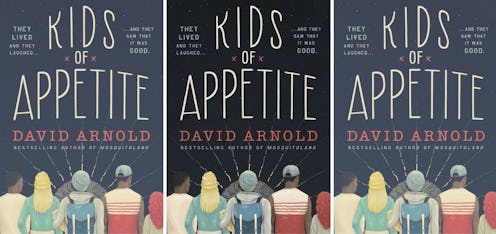Books
How David Arnold Balances Humor, Hurt & Heartbreak

Just last year, author David Arnold debuted his first novel, Mosquitoland , which became one of the most well-received, beloved books of 2015. He has a way of writing incredibly unique characters that leap off the page — just look at Mosquitoland's Mary Iris Malone, AKA Mim. She'd been lost and alone, but made readers laugh through their tears over the course of the book, and her journey to find her mom.
With his newest novel, Kids of Appetite , David Arnold returns to the complex journey that is young adulthood, with a quirky, endearing set of characters trying to find their way to acceptance in every form: acceptance of grief, of loss, and friendship in the most unlikely forms. Readers are reminded of the ragtag group of kids from Mosquitoland in the best way, but this is a group all their own. From poetic, seemingly lost Vic to the tightly knit foursome he initially sees only from afar, Kids of Appetite explores finding not only your friends, but making them a family of sorts, and the unbreakable bond unique to that period of adolescence.
It's possible that his characters resonate with readers so well simply because Arnold loves them so much. "Each of the characters has such a real struggle, unique to their own backgrounds and experiences," he says, "I love them. To my core."
The inspiration to explore that complex journey, Arnold says, came from re-reading S.E. Hinton's The Outsiders, and listening to Arcade Fire. Neither of which will come as a surprise: the book opens with a quote from that very book, something Arnold says was a favorite of his when he was a teenager himself. Other bookish influences include Jurassic Park, and J.D. Salinger, whom he loves unapologetically.
There’s just this sort of underlying thirst for life, a youthful recklessness that really comes through, and I think a lot of great art has this same quality—so I was interested in exploring that, to see if I could write a book from that place.
Kids of Appetite follows Vic, who suffers from Moebius syndrome, a rare neurological disorder that causes facial paralysis, as he navigates life after the loss of his father. Then there's Mad, who would rather live inside the world of her books than reality. Given the premise, it seems incredibly hard to believe that a book quite so heavy could be so loud-out-loud funny. How does Arnold find that balance between funny and heartbreaking, you ask?
I think the line between laughter and tears is very thin. Often, they even go hand in hand. Lots of times, I’ll start off trying to write a scene that I think will be funny, and it ends up just being really sad. And sometimes it happens the other way around. The important thing is to trust the characters, to go where they lead.
Vic's darkly funny response to his mom's new boyfriend is the perfect example of this combination of hilarity meeting heartbreak. He writes:
I quietly observed my mother, who, bizarrely, had yet to run screaming through the front door, racing down the street, pulling clumps of hair from her head, rending the clothes from her body, shrieking in havoc and mourning...or, at the very least, laughing, grabbing Dad's urn from its dark place of prominence in our hallway, shoving it in Frank's face and saying, I'm spoken for, bitch!
Writing a novel like this one, or even like Mosquitoland, gives a voice to loss and grief that is real in a way that is not often seen in books for teens, or adults. It's hard to write about, but Arnold does so beautifully. He tells Bustle he did not originally set out to write YA, or any genre in particular — rather, he set out to find his most authentic, unique voice.
Maybe it’s because I vividly remember my own childhood—the pains of not fitting in, of moving to a new town where cliques are long established and everyone knows the ins and outs of basically everything—that my voice naturally comes from this place. Whatever the reason, I’m thrilled to be doing it.
We're thrilled he's doing it, too! One thing that cannot be missed in the writing of Kids of Appetite, is its honestly. The characters are honestly portrayed, honest in their feelings, and just feel very real when you read them. The search for honesty in his writing stemmed from his background in music, Arnold says:
The key element in writing songs and writing novels is the same: try to be as honest as possible. In the acknowledgments of Mosquitoland, I thank Elliott Smith for teaching me that 'an honest voice is more compelling than a pretty one.' I’d much rather have something real than something perfect.
No matter what he's writing, Arnold tries to write as much as he can, whenever he can, a trick he learned by penning a best-seller while taking care of an infant.
I wrote while he napped, while he played, in cars, in bed, in the YMCA lobby, just about everywhere. He’s older now, in school, so I have a lot more time to write, but I think having that mentality—writing whenever, wherever, however I could—at such an early point in my career set the tone for how I write now.
Kids of Appetite is available now from Viking Books for Young Readers.
Image: Daniel Melgs